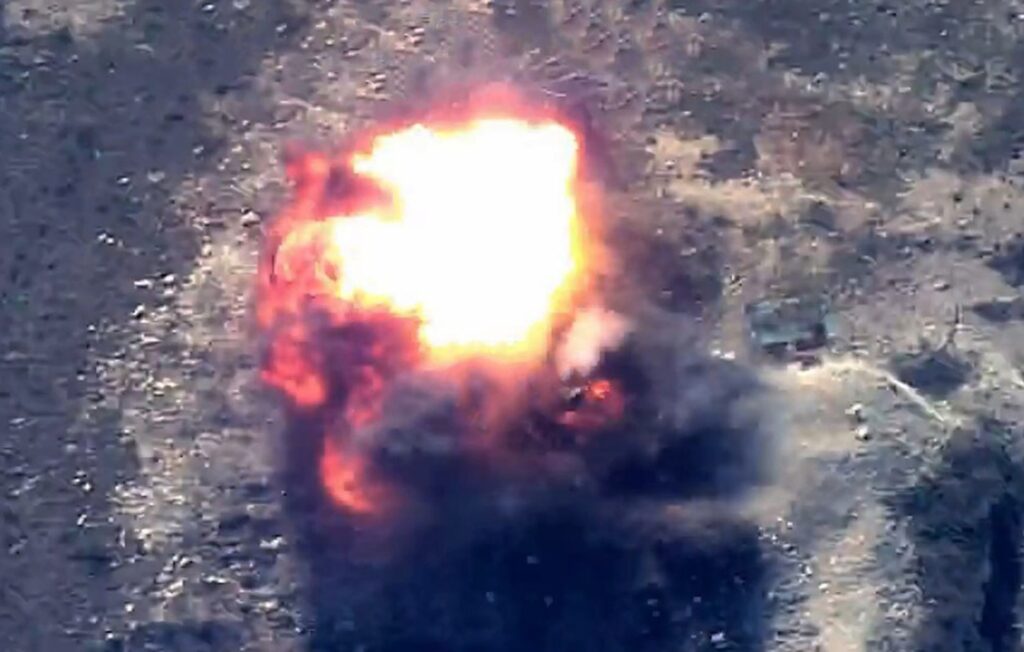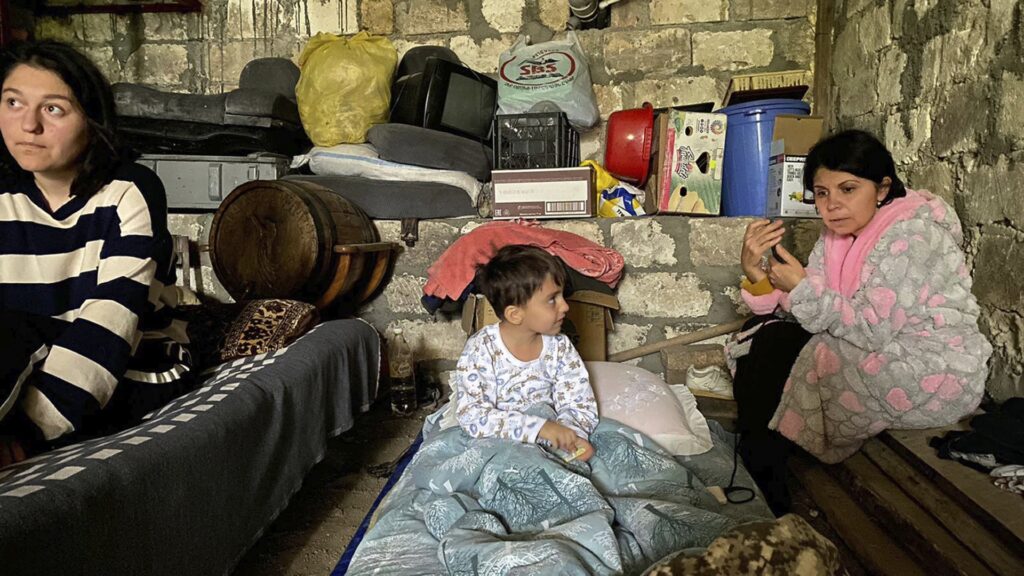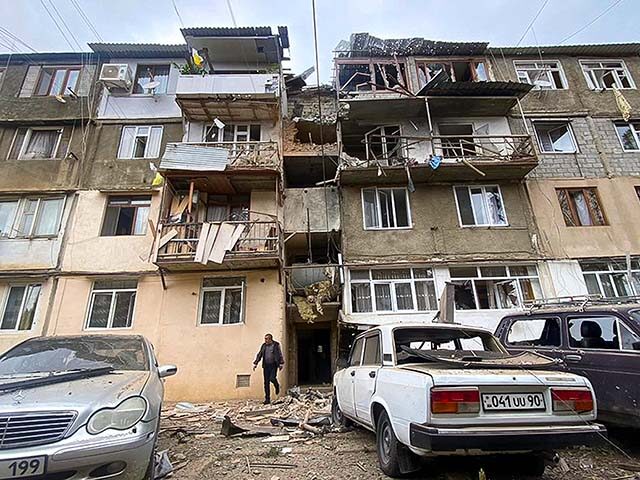Armenian separatists on Wednesday agreed to a cease-fire with Azerbaijan that effectively surrendered control of their territory to the Azeri government. The separatists agreed to disband and disarm their forces, and Azerbaijan agreed to halt military action against them.
The surrender came fairly quickly after Azerbaijan launched a massive assault on the Nagorno-Karabakh region, which lies within Azerbaijan’s post-Soviet borders but has long been inhabited by ethnic Armenians, who regard the region as their ancestral homeland.

In this photo taken from video released by Defense Ministry of Azerbaijan on Tuesday, Sept. 19, 2023, explosion flame rises over an area which Azerbaijan says hosts Armenian forces’ positions in the breakaway territory of Nagorno-Karabakh in Azerbaijan. (Defense Ministry of Azerbaijan via AP)
Azerbaijan described the offensive as an “anti-terrorist operation,” launched a few hours after four Azeri soldiers and two civilians were killed by landmines. The Azeri Defense Ministry claimed the mines were planted by Armenian operatives.
The Defense Ministry said its goal was to “disarm and secure the withdrawal of formations of Armenia’s armed forces from our territories” and “neutralize their military infrastructure.”
The Azeri invasion force reported immediate success, destroying over 60 Armenian military outposts and 20 military vehicles on the first day of the ground offensive, which was backed up with heavy artillery fire.
Armenia condemned the offensive as “another large-scale aggression against the people of Nagorno-Karabakh,” and accused Azerbaijan of “aiming to complete its policy of ethnic cleansing.”
Azerbaijani officials countered by claiming that any civilian “collateral damage” would be caused by Armenian fighters using civilians as “human shields.”

Children are in a shelter during shelling in Stepanakert in Nagorno-Karabakh, Azerbaijan Wednesday, Sept. 20, 2023. (AP Photo/Siranush Sargsyan)
Residents of Nagorno-Karabakh flooded social media with photos and videos of Azerbaijani artillery barrages hitting the regional capital of Stepanakert and damaging civilian areas, a far cry from Azeri claims of using “precision weapons” to strike only legitimate military targets. 32 casualties were reported by Nagorno-Karabakh officials as of Wednesday, including seven civilians, plus 200 injuries.
CBS News reported on Wednesday that Azeri shelling of Stepanakert appeared to continue after the cease-fire was announced.
Armenia’s Defense Ministry said the attack by Azerbaijan constituted a violation of cease-fire agreements reached after the previous Nagorno-Karabakh conflict in 2020. Armenian Prime Minister Nikol Pashinian pleaded with Russia, broker of the 2020 ceasefire, to intervene.
“First of all, Russia must take steps and, secondly, we expect the UN Security Council to also take steps,” Pashinian said on Tuesday.
The Russian Foreign Ministry said it was concerned about the military escalation, and was given only “several minutes” notice before Azerbaijan attacked, even though it has peacekeeping forces in the region. Russia said its peacekeepers would not intervene, however.
“The most important thing is to convince both Yerevan and Baku to reject using force and sit down at the negotiating table,” said Kremlin spokesman Dmitry Peskov, referring to the capitals of Armenia and Azerbaijan respectively.
U.S. Secretary of State Antony Blinken said the Biden administration was “deeply concerned by Azerbaijan’s military actions in Nagorno-Karabakh” and called on Azerbaijan to “cease these actions immediately.”
The office of Azerbaijan’s President Ilham Aliyev ignored these demands and said the offensive would continue until Armenian forces surrendered and gave up their weapons, which is what happened on Wednesday. Pashinian said his government had nothing to do with the ceasefire, which was negotiated between Azerbaijan and Russia.
Aliyev spokesman said on Wednesday that Armenian officials have agreed to meet with them in a town north of Stepanakert on Thursday to discuss complete “re-integration” of Nagorno-Karabakh into Azerbaijan.
Ethnic Armenians in Nagorno-Karabakh are clearly fearful of their future under “re-integration.” Russian forces said they evacuated 2,000 villagers as of Wednesday. More terrified civilians began massing near the Karabakh airport, defying official pleas for them to remain in their shelters.
The BBC speculated Russia might not have driven the hardest of bargains for Karabakh’s Armenians because Moscow was “annoyed” by Pashinyan’s “apparently pivot to the West.”
U.S. forces completed a ten-day joint military exercise with the Armenians on Wednesday. A U.S. military spokesperson said the training schedule was not altered by Azerbaijan’s attack on Nagorno-Karabakh.
“We were aware that they were conducting operations but we didn’t assess there to be any risk to our soldiers at the time and so they remained for the duration of the exercise,” the spokesperson said.
The Russians were vocally displeased with the exercise even though it involved only a few hundred troops from the U.S. and Armenia. The Kremlin viewed the exercise as a challenge to its peacekeeping authority and regional dominance.
“Of course, such news causes concern, especially in the current situation. Therefore, we will deeply analyze this news and monitor the situation,” Kremlin spokesman Dmitry Peskov said as the ten-day operation was getting underway.
Pashinyan barely held on to his office after losing the 2020 conflict over Nagorno-Karabakh, and he might have trouble getting past the surrender. Thousands of protesters flooded the streets of Yerevan on Tuesday night, smashing the windows of government offices and fighting with the police, who tossed stun grenades into the angry crowd.
“If we had good leadership, we would be able to resist what is happening. All these people are ready to go and fight,” one protester told the UK Guardian, indicating the hundreds of angry demonstrators swarming around him.
“If he can’t do anything, he should resign. He’s a coward,” another protester said of Pashinyan.
“What is going on is an Armenian genocide. It’s a genocide in the 21st century,” warned a third.
The demonstrators were not pleased with Moscow, either. Some of them prevented Russian diplomats from entering their embassy in Yerevan on Tuesday night with chants of “murderers, murderers, murderers.”
“We want to get rid of the Russians once and for all. In 400 years, this is the first time Russia is not as strong as it was. We have an historical opportunity to get rid of them,” one of the demonstrators blockading the Russian embassy told the Guardian.
The European Parliament on Tuesday issued a statement denouncing Azerbaijan’s offensive and threatening to scuttle an expensive gas deal with Baku. The deal was struck last summer by European Commission President Ursula von der Leyen, who embraced Aliyev as a “reliable, trustworthy partner” in her eagerness to secure alternatives to Russian gas.
“In the absence of an immediate halt to the ongoing attack, we call on the Council to fundamentally reconsider the EU’s relations with Azerbaijan in this light, and consider imposing sanctions against responsible Azerbaijani authorities,” the European Parliament said.
Some members of the European Parliament went even further and called for immediate sanctions against Aliyev, plus suspension of the gas deal.
“It is very important that this current military operation is not used as a pretext to force the exodus of the local population from Karabakh,” European Union foreign policy spokesman Peter Stano said on Wednesday.
“The EU is watching the situation very closely. And the member states will decide next steps in this context as we see the developments unfolding on the ground,” Stano said.
Influential Azerbaijani think-tank director Rusif Huseynov scoffed at these threats, pointing out that the lighting-fast offensive against Nagorno-Karabakh was designed to be over before the Europeans could do anything about it.
“At some point there has been a slight fear about possible sanctions or action by Western capitals against Azerbaijan, but this probability was always considered low, especially at an EU level, because Azerbaijan likes to have strong bilateral relations with different EU member states – Italy and Hungary most importantly – and at least one or two will always help us avoid any kind of huge barriers or sanctions,” Huseynov said.

COMMENTS
Please let us know if you're having issues with commenting.